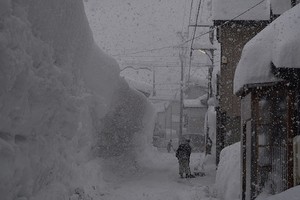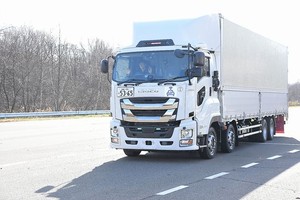By SHIGETAKA KODAMA/ Staff Photographer
March 10, 2022 at 15:30 JST
Editor’s note: This is the second installment of a five-part series in which Japanese from all walks of life recall their experiences and backgrounds in the context of the Great East Japan Earthquake and tsunami disaster of March 11, 2011. Each person recounts what they touched that day or on those that followed to offer a perspective on touching the lives of others.
***
KATSURAO, Fukushima Prefecture--Rancher Nobuo Matsumoto ruminated on the lives of cows as he held up a handful of snow on the former site of the cowshed where he was forced to let his animals starve to death.
“A cow sheds tears more often than a human does. It does not cry out and understands it will be slaughtered,” the 70-year-old said.
Matsumoto would have normally been taking the calves of his dairy herd out to graze, nurturing them daily until they grew fat enough to be sold in a local cattle market. But that was before the 2011 disaster.
Matsumoto, who now lives elsewhere as an evacuee, often returns to this village to patrol the area as a security precaution.
He is always overjoyed when a calf is born safely.
He smothers them with affection and gently guides them to their mother’s udder to suckle milk from a teat.
“That was my daily life,” he said, recalling the warmth of the calves in his hands.
A calf he named “Kibo” (Hope) was born 10 days after the nuclear disaster. The name reflected his hopes that everything would soon settle down quickly.
But it was not to be.
His cowshed was located 29.8 kilometers in a straight line from the crippled Fukushima No. 1 nuclear power plant operated by Tokyo Electric Power Co.
Transfer restrictions imposed on his farm did not allow Matsumoto to evacuate his livestock.
So about a month after the triple meltdown, Matsumoto secured his cows with ropes to a farm building, which ensured they would starve to death.
Kibo, the new calf, died, too.
“My hands held the power to keep them dead or alive,” the rancher said.
When Matsumoto thinks back to the feeling of patting the hair on the cows’ hides, his eyes water up and he wipes away his tears with his hands.





















A peek through the music industry’s curtain at the producers who harnessed social media to help their idols go global.
A series based on diplomatic documents declassified by Japan’s Foreign Ministry
Here is a collection of first-hand accounts by “hibakusha” atomic bomb survivors.
Cooking experts, chefs and others involved in the field of food introduce their special recipes intertwined with their paths in life.
A series about Japanese-Americans and their memories of World War II